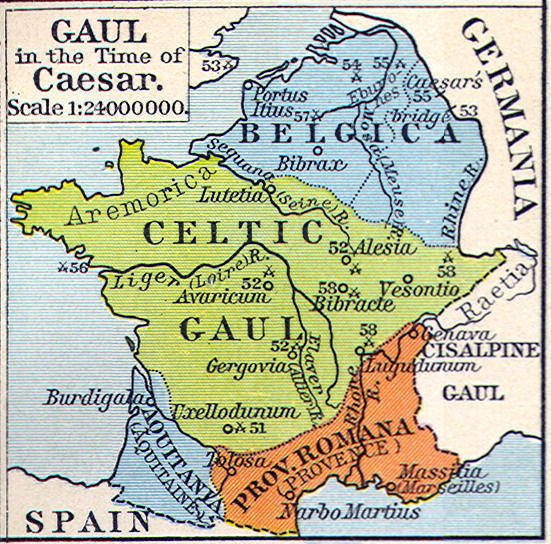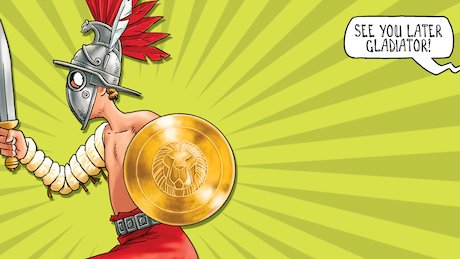
After the Gauls – whose contribution to the French language we looked at here – come the Romans. Julius Caesar launched an invasion of what would be modern-day France in 58 BCE, and by the end of the decade, Gaul was part of the Roman Empire, in which it would remain for the next five hundred years. With them came the Latin language, and the history of the centuries that followed is one of a gradual displacement of the Gaulish language, from the administrators and traders down to the ordinary people, by the language of the conquerors. In grammar and vocabulary, Latin forms the basis of modern French, as it does for modern Spanish and, more closely still, modern Italian.

The Gallo-Romans spoke a language that was coloured by the older languages of their region, and continued to evolve across the centuries into the various French dialects that made up the language by the medieval period. (The spread of a single, dominant variety of French, based largely on the dialect spoken in Paris, is a much more recent story.) The point in this evolution at which people are no longer speaking Latin, but are now speaking French, is a bit of an arbitrary one. Historians of the French language often point to a document written in the year 842, the Oaths of Strasbourg as the earliest example of written French. It’s an pact between two of Charlemagne’s grandsons, Louis the German and the unfortunately nicknamed Charles the Bald, who are ganging up against their brother, Lothair. Would you like a quick look? Here’s the first sentence:
Pro deo amur et pro christian poblo et nostro cummun saluament d’ist di en auant, in quant Deus sauir et podir me dunat, si saluarai eo cist meon fradre Karlo, et in aiudha et in cadhuna cosa, si cum om per dreit son fradra saluar dift, in o quid il mi altresi fazet, et ab Ludher nul plaid nunquam prindrai qui mon uol cist mein fradre Karl in damno sit.
And here’s the same thing in modern French:
Pour l’amour de Dieu et pour le salut commun du peuple chrétien et le nôtre, à partir de ce jour, autant que Dieu m’en donne le savoir et le pouvoir, je soutiendrai mon frère Charles de mon aide et en toute chose, comme on doit justement soutenir un frère, à condition qu’il me fasse autant, et je ne prendrai jamais aucun arrangement avec Lothaire, qui, à ma volonté, soit au détriment de mondit frère Charles.
You might not totally agree that it’s right to call the top one French, but it’s definitely not Latin: the oaths actually include a Latin translation of the Old French text (as well as a German one), showing that people at the time thought of them as quite distinct languages.
What’s interesting here, though, is that precisely at this moment that French was breaking free of Latin to become a separate language in its own right, Latin was making a whole new invasion of France. This time it wasn’t being brought by Roman soldiers, but by French scholars.
In late 700s and 800s, when Charlemagne and his successors ruled much of Western Europe, there were rapid developments in literature, law, the arts, architecture and religion. (The period is sometimes called the Carolingian Renaissance.) All this new scholarship needed new, more rigorous terms, and the scholars turned to Latin to coin new words. Over the preceding centuries, the latin words fragilem (fragile), frater (brother) and proxima (near) had drifted into the French words that would become today’s frêle, frère, and proche. In the Carolingian Renaissance, though, French scholars reached back to Latin to coin more formal words like fragile, or to fill in other parts of speech like fraternel (the adjective ‘brotherly’) or proximité (the noun ‘proximity’ or ‘nearness’). French today is full of pairs like these: a noun like père which has evolved from the Latin pater over the long centuries since Caesar’s invasion is accompanied by the adjective paternel, coined from a return to the Latin from hundreds of years later . Some other double borrowings from Latin you’ll come across are vide and vacuité (empty and emptiness, both from Latin vacuus), entier and intégrité (whole and wholeness, from Latin integer), aigu and acuité (sharp and sharpness, from Latin acutus), even hôtel and hôpital (both from Latin hospitalis), along with many others. Of course, a similar process happened in English, where we often have words of Anglo-Saxon origin (king), Norman French origin (royal), and Latin origin (regal) rubbing up alongside one another, and becoming more formal the closer we get to Latin.
So that’s Gaulish and Latin as the roots of French. There’s one further important influence to come, though, which slots in between the two Latin waves of Caesar and Charlemagne. The last one, which I’ll tell you about in a future post, is a people who not only left their mark on the French language, but also gave their name to it, as well as to the people who speak it and the country they live in. Our last French root will be the Franks.

